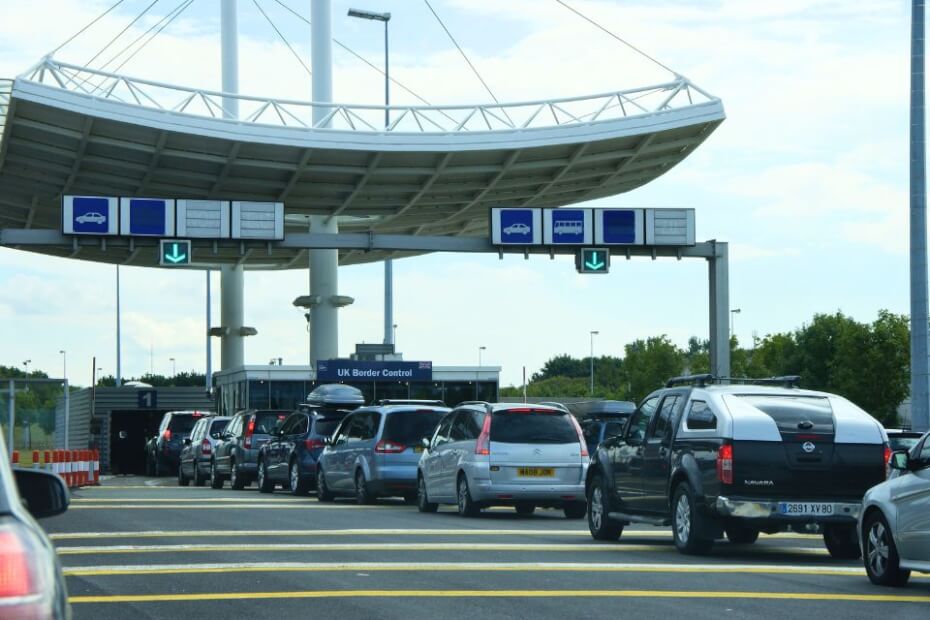
Planning a trip to Spain, France, Italy, or Germany? Brits might think twice if the new European Union (EU) border check system causes long delays.
The United Kingdom (UK) Department for Transport polled 1,584 people aged 16 and over about the EU’s Entry/Exit System (EES).
The survey found that one in seven British people said they were less likely to visit continental Europe due to the EES.
The biggest concern is getting stuck waiting in the extremely long queues the EES could cause.
Around 20 percent said they would cancel or postpone a ferry, car, or coach trip to the EU if the new system caused more than a one-hour delay.
Even shorter delays could cause some to postpone their travel plans, with six percent saying they’d reconsider any disruption up to an hour long.
The survey revealed that most people (69 percent) weren’t aware of the EES, having never heard of it until the survey.
Of those who did know about it already, only four percent said they learned a lot of details.
After learning what the EES involves, the top concern (67 percent) was the longer queues at the border when departing the UK.
More than half (59 percent) were concerned about the time and effort needed for the initial registration.
Other concerns involved collecting fingerprints (31 percent) and taking facial photos (26 percent).
Those most familiar with the EES were less concerned.
However, there was still a fair amount of apprehension regardless of the person’s prior knowledge level.
The new EU border check system
Starting on 6 October 2024, the EU will launch its new automated border check system called the Entry/Exit System or EES.
The new system replaces manual passport stamping for non-EU travelers entering or leaving the Schengen Area.
Visiting the EU for the first time after the EES goes live, UK and other non-EU nationals will need to register fingerprints and facial scans.
Under the current laws, first-time EES registration should be done before an EU border officer.
Travelers’ biometric data will be stored in the EES database for a maximum of three years.
Using fingerprint or facial scans, the EES will record travelers’ entry and exit from the EU on subsequent visits.
If travelers visit the EU after the three years have lapsed, they must register their biometric data again.
The new system could lead to long lines and significant delays at border crossings like the Port of Dover, St. Pancras Station in London, and the Channel Tunnel terminal in Folkestone.
At these UK-EU border crossings with juxtaposed controls, EU border officers perform immigration checks on UK soil.
These borders also have space and infrastructure limitations to manage the potentially long snaking queues.
Calls to minimize travel disruption
Travel industry experts are urging the UK and EU to take steps to minimize disruptions when the new rules start.
Phil Smith of the Confederation of Passenger Transport (CPT) warned it’s “vital” that UK ports have “systems in place” to handle the EES efficiently.
He pointed out that British coach companies going to Europe generate over £14 billion annually from around 23 million trips.
Long delays at border crossings could threaten significant revenue not just for the UK but also for European destinations.
Smith told The Independent that CPT has worked hard with port authorities “to ensure there will be swift and efficient passport checks.”
The aim is that “a full coach of 50 passengers will complete this process without delay.”
“It is also important that other traffic does not experience delays, too,” Smith added.
This is “because coaches share road space, so efforts to prevent congestion in and around our Channel ports will be essential, too.”
Julia Lo Bue-Said, head of the Advantage Travel Partnership network of travel agencies, said, “Safety and security are paramount.”
However, she also stressed the need to ensure travelers understand how the EES will impact them.
Lo Bue-Said hopes delays will be minimal once the system runs smoothly.
However, she advises travelers “to be prepared in case of delays.”
EES delays could affect the UK and EU economies
Despite the concerns, most UK citizens surveyed said they’d still be just as likely to travel to Europe after the EES starts.
The UK government survey showed that 63 percent or more of people across all prior awareness levels chose that option.
However, the number of people expressing hesitance could be a worrying sign for EU tourism.
Even temporary dips in British visitors would likely be felt across noteworthy destinations.
UK travelers are a crucial market, completing around 67 million visits to the EU in 2019 before the pandemic.
They also tend to take longer trips and spend more than other nationalities.
There have been calls from many groups for the EU to delay the EES’s October 2024 launch.
Some are pushing for an early 2025 launch or until the mobile app for advanced EES registration is fully ready.
Two UK parliamentary committees and French officials have outright urged the delay of the new EU border checks.
Transport groups pledge smooth EES checks despite concerns
Despite the worries, transport operators insist they can implement the EES without causing substantial travel chaos and delays.
Getlink, the company running the Channel Tunnel, and Eurostar assured travelers that once the EES goes live, there will be no chaos or long delays at its terminals.
Still, Eurostar admitted it predicts only a two- to three-minute increase in passport processing time per person.
The Port of Dover expects the EES to increase border check processing time from 45 to 90 seconds per person to two minutes or more.
The transport groups acknowledge that the EES rollout will cause delays and changes for UK travelers heading to the EU.
Only time will tell whether it severely disrupts travel between Britain and continental Europe this fall.
For now, a sizable portion of UK residents are bracing for potential delays that could derail or deter their EU holidays.

